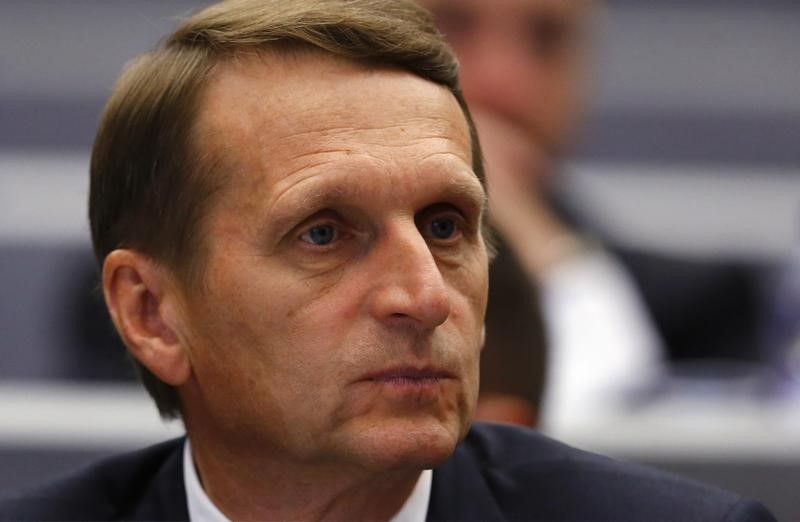By Elizabeth Piper
MOSCOW (Reuters) - Russia's lawmakers should take a pay cut to help Moscow through a financial crisis, the speaker of parliament said on Tuesday, appealing to their patriotism as Western sanctions over Ukraine drain the economy.
Sergei Naryshkin, speaker of the State Duma, said he had asked all four groups in the lower house of parliament to discuss the money-saving initiative, and would take it to Kremlin leader Vladimir Putin if they agreed.
"Of course it comes under the competence of the head of state ... so if the parties are in favour of my suggestion, we will put it to the president," he told reporters.
Members of parliament earn about 13 times more than the average worker, so a pay cut would impose little hardship but would send a signal to ordinary Russians of the need for sacrifice at a time of heightened confrontation with the West.
Sanctions over Ukraine, where the United States and European Union accuse Russia of fuelling a separatist war, have combined with a halving of world oil prices since last June to undermine the rouble and tip the economy towards recession.
In January, Finance Minister Anton Siluanov said all budget expenditure should be cut by 10 percent except for social spending and defence, a priority for Putin as he seeks to rebuild Russia's military might.
But anger is growing at the mass cuts as firefighters, police officers and, according to some reports, spies lose jobs and perks, striking at the core of one of Putin's largest support bases.
Some officials have suggested even defence may not be spared, and many have called on Russians to stomach the hardship for the greater good of the country. Moscow denies destabilising Ukraine and blames Kiev and its Western allies for the crisis.
Valentina Matviyenko, speaker of parliament's upper house, the Federation Council, said senators there were also discussing cuts in their salaries.
The Duma could not immediately give a figure for what its members get paid on average, but local media say they earn a monthly pre-tax salary of around 420,000 roubles (4,312 pounds), including bonuses. Deputies also enjoy prestige and immunity from prosecution.
According to declarations made in 2013, deputies earned anything up to 1.71 billion roubles that year, including profits from their own businesses. Naryshkin reported that he earned 2.71 million roubles in 2013.
Average workers' pay in November 2014 was 32,546 roubles, according to the state statistics service.
